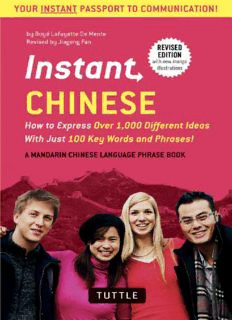
Instant Chinese : How To Express Over 1,000 Different Ideas With Just 100 Key Words And Phrases! (A Mandarin Chinese Language Phrasebook) PDF
Preview Instant Chinese : How To Express Over 1,000 Different Ideas With Just 100 Key Words And Phrases! (A Mandarin Chinese Language Phrasebook)
Preface In 1949 the newly established Chinese government issued an edict making Mandarin the national language of the country and mandating that it be taught in all schools. Today, virtually most Chinese speak Mandarin Chinese, known as putonghua (puu-toong-whah) or “the common language,” as their first or second language. This book uses English phonetics to represent the syllables making up Mandarin Chinese, making it possible for total newcomers to the language to communicate quickly and easily on a basic level without any previous introduction to the language. In addition, each Chinese word is given its tone in pinyin—this is to enable those with a basic knowledge of Spoken Chinese to say the words more accurately, if they wish. However, for those who know nothing about tones, the phonetic versions presented here are close enough to the “correct” pronunciation that the meaning is generally understandable. With eight major “dialects” in China [some are actually different enough to be called languages!], the Chinese are used to coping with a variety of accents and variations in the tonal quality of speakers. They are especially tolerant of foreigners who make an effort to speak Chinese, and go out of their way to help them. Here are a number of important introductory terms to get you started, keeping in mind that the phonetics are designed to be pronounced as English: China Zhōngguó (Johng-gwoh) 中国 Chinese Language Hànyǔ (Hahn-yuu) 汉语 or Zhōngwén (Johng-wern)* 中⽂ Chinese (person) Zhōngguórén (Johng-gwoh-wren) 中国⼈ Beijinger Běijīngrén (Bay-jeeng-wren) 北京⼈ Shanghaiese Shànghǎirén (Shanghai-wren) 上海⼈ Overseas Chinese Huá Qiáo (Hwah Chiaow) 华侨 Hong Kong Xiāng Gǎng (She-ahng Gahng) ⾹港 Kowloon Jiǔlóng (Jow-lohng) 九龙 Macao Àomén (Ow-mern) 澳门 *Hànyǔ is the literary term for the Chinese language; Zhōngwén is the term generally used in ordinary speech. Part 1 1 Hello Nǐ hǎo (Nee how) 你好 Hello! (to one person) Nǐ hǎo! (Nee how) 你好! Hello! (to more than one person) Nǐmen hǎo! (Nee-mern how) 你们好! Good morning! (until about 10 a.m.) Nǐ zǎo! (Nee zow) 你早! Good morning! (very polite form) Zǎoshang hǎo! (Zow-shahng how) 早上好! Good afternoon / Good evening! Nǐ hǎo. (Nee how) 你好! Good night! Wǎn ān! (Wahn ahn) 晚安! Goodbye! Zài jiàn! (Dzigh jeean) 再见! 2 Thank You Xièxie (Shay-shay) 谢谢 Thank you. Xièxie. (Shay-shay) 谢谢。 Thank you very much. Fēichǎng gǎnxiè. (Fay-chahng gahn-shay) ⾮常感谢。 Thank you for your hospitality. Duōxiè nǐ de kuǎndài. (Dwoh-shay nee der kwahn-die) 多谢你的款待。 No, thanks. Xièxie, bú yào. (Shay-shay boo yee-ow) 谢谢,不要。 Don’t mention it. / You’re welcome. Búkèqi. (Boo ker-chee) 不客⽓。 3 Sorry / Excuse Me bàoqiàn (bow-chee-an) 抱 歉 I’m sorry, I apologize. Duìbuqǐ. (Dway-boo-chee) 对不起。 I’m very sorry. Wǒ hěn bàoqiàn. (Woh hern bow-chee-an) 我很抱歉。 Excuse me. (to get attention, make way) Láo jià. (Lao jah) 劳驾。 Excuse me… (May I trouble you) Máfan nǐ… (Ma-fahn nee…) ⿇烦你 … Excuse me… (May I ask a question) Qǐng wèn… (Cheeng wern…) 请问 … 4 Please Qǐng (Cheeng) 请 Please hurry! Qǐng gǎnkuài! (Cheeng gahn-kwigh) 请赶快! Please be careful. Qǐng xiǎoxīn yìdiǎn. (Cheeng she-ow-sheen ee-dee-an) 请⼩⼼⼀点。 Come in, please. Qǐng jìn. (Cheeng jeen) 请进。 Please sit down. Qǐng zuò. (Cheeng zwoh) 请坐。 Can you please help me? Néng bāng wǒ yíxià ma? (Nerng bahng woh ee-she-ah mah) 能帮我⼀下吗? Please write it down. Qǐng xiě xiàlai. (Cheeng shay she-ah lie) 请写下来 。 Please write it in Roman letters. Qǐng yòng pīnyīn xiě. (Cheeng yohng Peen-een shay) 请⽤拼⾳写 。 5 I Wǒ (Woh) 我 I’m an American. Wǒ shì Měiguórén. (Woh shr May-gwoh-wren) 我是美国⼈。 I’m British/English. Wǒ shì Yīngguórén. (Woh shr Yeeng-gwoh-wren) 我是英国⼈。 I am _____. Wǒ shì _____. (Woh shr _____) 我是 _____。 Australian Àozhōurén (Ah-oh-joe-wren) 澳洲⼈ Canadian Jiānádàrén (Je-ah-nah-dah-wren) 加拿⼤⼈ French Fǎguórén (Fa-gwoh-wren) 法国⼈ German Déguórén (Duh-gwoh-wren) 德国⼈ Japanese Rìběnrén (Ree-bern-wren) ⽇本⼈ Spanish Xībānyárén (She-bahn-yah-wren) 西班⽛⼈ I am from _______.
Description: